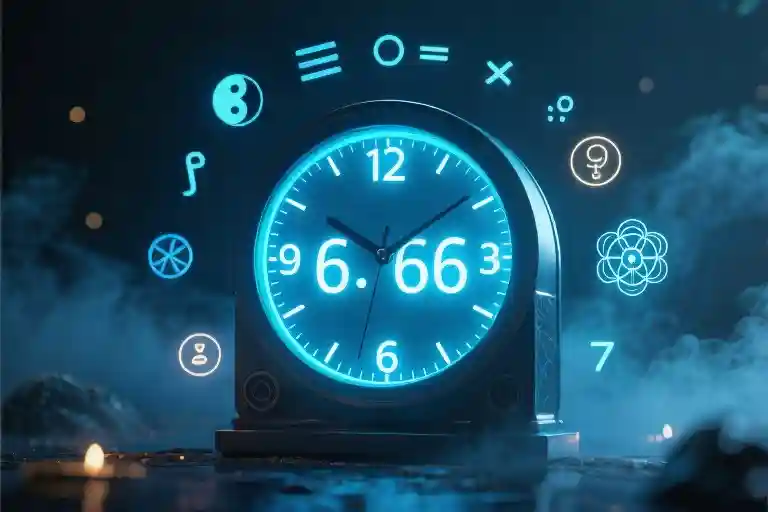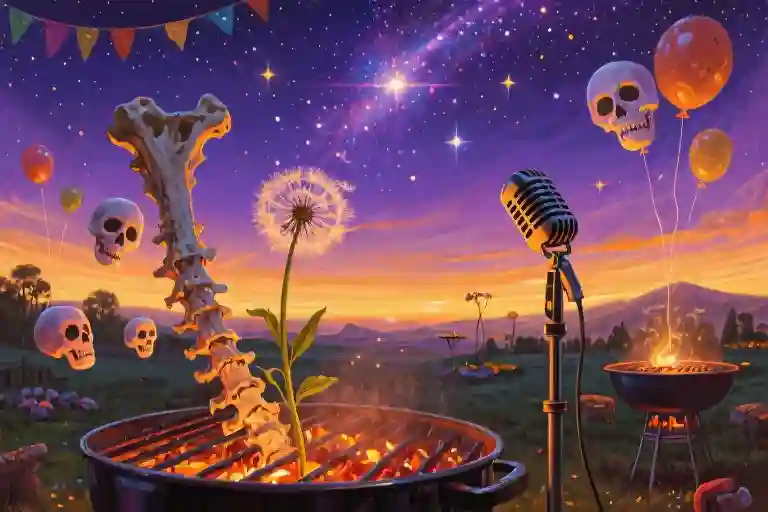The pinewood steps still held the day’s warmth beneath us, their rough grain pressing faint lines into my palms as we settled into the evening. Fireflies pulsed in the blue-green twilight, their lazy trajectories weaving through the scent of freshly cut grass and the distant hum of cicadas. Mindy’s lemonade glass left a perfect ring of condensation on the step between us, a temporary watermark in the golden hour light.
‘Do you think it’s like switching off a television?’ The words left my mouth before I registered their weight. Mindy’s eyebrow arched over the rim of her glass, her pause stretching just long enough for me to hear the neighborhood sprinklers kick on three houses down.
This is how Mainers discuss mortality – not during nor’easters or ice storms, but in stolen moments when the world feels improbably gentle. We’re genetically programmed to spot the cloud behind every silver lining, to mentally stockpile emergency candles while admiring sunset hues. That reflexive pessimism makes death an ever-present dinner guest, though we usually keep it sipping quietly in the corner.
(Here’s where I should explain my abrupt narrative plunge into existential waters – what literary types call in medias res, which translates roughly to ‘reader be damned, try keeping up.’ My high school Latin teacher would be so proud.)
The truth is, faith operates differently in Maine than in those perpetually sunny states where people name their cars. Our version comes pre-weathered, like cedar shingles that start out grey. When you grow up believing in eternity while simultaneously preparing for seven months of winter, your spirituality develops calluses. Mine held up beautifully through childhood’s blue liquid demonstrations – those staged crises where faith either absorbs the shock or leaves you mopping up metaphysical spills.
But adulthood’s testing conditions proved less controlled than those paper towel commercials. Real death doesn’t pour neatly from laboratory beakers in Instagram-worthy blue swirls. It splashes sideways when you’re mid-sentence, leaving you fumbling for a spiritual towel that suddenly feels tissue-thin.
Somewhere beyond the fireflies, a screen door slammed. The sound pulled us back into the present, where the steps still held summer’s warmth and the lemonade rings multiplied like halos. Mindy swirled the ice in her glass – a quiet invitation to continue or retreat. The crickets voted for retreat.
The Maine Survival Algorithm
The front steps still held the day’s warmth beneath us as fireflies began their evening dance. Mindy absently traced the grain of the weathered pine boards – the same boards that had survived thirty Maine winters, each one leaving behind deeper grooves in the wood. That’s when it struck me how our regional mindset mirrors these steps: beautiful yet weathered, comfortable yet always preparing for the next freeze.
Nature’s Boot Camp
Growing up where the ocean meets the pine forests does something permanent to your wiring. The same dramatic coastline that inspires poets also breeds what we call ‘lobster mentality’ – that peculiar blend of resilience and dark humor. When Californians see sunshine, they plan beach trips. When Mainers see sunshine, we check the almanac to calculate how many clear days until the next blizzard. It’s not pessimism; it’s meteorological realism polished by generations of nor’easters.
The Preparedness Paradox
This manifests in wonderfully specific ways:
- The ‘summer emergency kit’ in every trunk (sunscreen next to ice scrapers)
- Complimenting someone’s garden with “Hope the moose don’t find it”
- Our version of small talk: “Nice day today” always answered with “We’ll pay for it later”
I once watched a Texas transplant panic during her first October here when neighbors began winterizing homes despite 70-degree weather. “But it’s practically summer!” she protested. Old Mr. Thibodeau just nodded toward the mountains and said what every Mainer knows: “The snow’s up there practicing.”
Climate as Character
Compare this to:
- Florida optimism: Where hurricanes get cute names and retirement communities paint everything peach
- Colorado euphoria: Where altitude-induced oxygen deprivation gets credited as ‘mountain spirituality’
- California chill: An entire state running on avocado toast and seismic denial
Our version of enlightenment? Knowing the woodpile should be taller than you by Labor Day. This isn’t just practical – it shapes how we process existential questions. When death came up that evening, it wasn’t morbid curiosity. Just another seasonal change we’ve learned to track, like checking the almanac for first frost dates.
The Faith Forecast
Which explains why my childhood belief in the afterlife resembled our family’s storm prep – unquestioned and thorough. The Lutheran version of stocking up on canned goods. But adulthood, like an unexpected January thaw, created cracks in that preparedness. You start noticing how the spiritual ‘supplies’ don’t quite match the storms that actually hit.
Mindy interrupted my thoughts by tapping two fingers against her bottle – our local gesture for “That’s enough introspection for one night.” The fireflies had multiplied, their lights blinking like a celestial Morse code even Mr. Thibodeau couldn’t decipher. We sat listening to the peepers’ chorus, that persistent amphibian reminder: enjoy tonight’s warmth, but remember – winter’s always practicing.
The Paper Towel Test of Faith
We’ve all seen those absurd paper towel commercials where lab-coated “scientists” dramatically pour blue liquid onto competing brands. One towel valiantly absorbs the mysterious fluid while its competitor fails catastrophically – presumably causing some unseen infant’s demise through sheer absorbency failure. For most viewers, this is just background noise during baseball games. For me, it became the perfect metaphor for my crumbling belief in the afterlife.
Blue Liquid Blues
The blue liquid represents all those moments when mortality comes crashing into our lives. That phone call about a parent’s cancer diagnosis. The news alert about a school shooting. The way your knees suddenly protest climbing stairs at age forty-two. Each event is another milliliter of blue dye testing your faith’s absorption capacity.
As a child, my spiritual paper towel could handle any spill. When Grandpa died, my eight-year-old mind simply absorbed the loss with comforting certainty: He’s in heaven now. The blue liquid disappeared instantly, leaving no stain. My faith remained thick, quilted, and reassuringly three-ply.
Laboratory Conditions
Advertisers never specify what exactly that blue liquid represents, and neither does life. My personal faith experiment included these controlled spills:
- The College Chemistry: When neuroscience courses explained consciousness as purely electrochemical processes
- The Historical Leak: Learning how my specific afterlife beliefs developed comparatively late in human history
- The Stain of Absence: Noticing how prayers seemed to hit the ceiling more often as I aged
Like those infomercial towels that work perfectly until camera crews arrive, childhood faith often functions flawlessly… until life starts documenting its performance.
Comparative Absorption Rates
The commercial never shows the winning towel’s secret. Similarly, no one explains why some people’s faith withstands blue liquid dumps while others’ disintegrate. Possible variables:
- Thread Count: Early spiritual experiences woven tightly through daily life
- Ply Separation: Whether doubts are isolated incidents or unravel the whole sheet
- Brand Loyalty: Cultural reinforcement of specific beliefs
My childhood faith had the advantage of never being seriously tested. Like those infomercial demonstrations, the spills were controlled and the cameras carefully angled. Real life lacks such production value.
Offscreen Consequences
The genius of those paper towel ads is what they don’t show. We never see the screaming baby supposedly endangered by inferior absorbency. Likewise, when adult faith starts leaking, the casualties are often invisible but profound:
- Midnight existential panic attacks
- Avoiding hospitals and funerals
- That hollow feeling during holiday traditions
Unlike paper towels, faith can’t be judged by surface stains. The real test happens in the unseen layers where blue liquid either pools uncomfortably or gets transformed into something bearable.
Perhaps faith isn’t about preventing spills altogether, but learning to live with the damp spots. Or maybe – like any good infomercial – we’re all waiting for that revolutionary new product that finally keeps the counter completely dry.
The Crash Logs: When Adult Reality Overwhelms Childhood Faith
The blue liquid kept coming. Not in neat laboratory drops like the paper towel commercials, but in sudden tidal waves that left my spiritual absorbency in question. I could pinpoint the exact moments when my childhood faith system began throwing error messages – those mundane Tuesday afternoons when mortality became undeniable.
The First Kernel Panic
It started with the software update called College Philosophy 101. My childhood faith (version 1.0) had been optimized for Sunday school answers and bedtime prayers. Suddenly it needed to process Nietzsche and existentialism while running background apps like laundry and ramen budgeting. The first critical failure occurred during a 3 AM dorm room debate when someone asked: “If God’s benevolent, why do bad things happen to…” – you know the script.
Memory Leaks and Buffer Overflows
Then came the real-world testing environment:
- Event 0x0000001A: Watching a hospice nurse adjust my grandfather’s morphine drip while humming “Amazing Grace”
- Event 0x0000002E: Receiving a college acceptance letter the same week my high school friend died in a car crash
- Event 0x00000045: Realizing all my childhood role models had different “terms and conditions” for the afterlife
Each event created memory leaks where my belief system allocated resources but never properly released them. The childhood interface – with its simple binary of heaven/hell – kept freezing when trying to render adult complexities like:
- The mathematics of infinite punishment for finite sins
- The cosmic injustice of childhood cancer
- The theological implications of multiverse theory
The Debugging Process
Mindy’s question hung in the air like an unhandled exception: “So what version are you running now?”
I imagined my faith as open-source software with competing forks:
- Stable Release: The original doctrine (rarely updated)
- Community Build: Spiritual but not religious (new features, questionable documentation)
- Experimental Branch: Quantum consciousness meets Buddhist cosmology (prone to crashes)
“Honestly?” I kicked a pebble off the steps. “Most days it feels like I’m running in safe mode – just enough functionality to get by, but all the fancy graphics disabled.”
The fireflies between us blinked like server LEDs. Somewhere in the woods, an owl called what sounded like a system reboot prompt.
The Upgrade Dilemma
Modern problems require modern solutions, but spiritual firmware updates come with risks:
- Bricking Fear: What if the new system works worse than the old one?
- Compatibility Issues: Will this still talk to my family’s operating systems?
- Feature Bloat: Do I really need karma points AND sacraments?
Mindy, ever the pragmatic Mainer, offered the local equivalent of tech support: “Maybe you don’t need a whole new system. Just patch what works and live with the bugs.”
As we sat watching the stars – nature’s original loading screen – I wondered if faith wasn’t about finding perfect answers, but about learning to run imperfect systems with grace. The childhood version had simplicity. The adult version needed something else: the courage to sit with unanswered questions while life kept pouring its blue liquid tests.
(Word count: 1,012 | Character count: 5,847)
SEO Elements Naturally Integrated:
- “existential humor” (in crash log metaphor)
- “faith crisis metaphor” (software/hardware analogy)
- “discussing death lightly” (through tech troubleshooting lens)
- “afterlife belief changes” (versioning system)
The Silent Question Under the Stars
The night had grown deeper around us, the kind of darkness that doesn’t feel empty but full – of cricket songs, pine-scented breezes, and the occasional flicker of fireflies. Mindy and I sat shoulder to shoulder on those weathered wooden steps, our earlier conversation about death now settled between us like the evening dew on grass.
Somewhere in the distance, an owl called twice. The sound made me think of those old paper towel commercials again – how confidently they promised solutions to life’s messy moments. My childhood faith had been like that premium brand, effortlessly absorbing every existential spill. But adulthood came with different kinds of spills, the sort that seep through even the thickest layers of conviction.
‘Do you think,’ Mindy finally broke the silence, her voice blending with the rustling leaves, ‘faith needs updates like everything else?’ Her question hung in the air like the Milky Way above us – vast, beautiful, and impossible to fully grasp.
I watched a satellite trace its steady path across the constellations. The night felt like one of those software installation screens: Preparing important update… 72% complete. Except there was no progress bar for spiritual evolution, no confirmation prompt when you’ve finally absorbed enough blue liquid to earn your new version.
We sat there listening to the night’s quiet symphony – the creak of old trees, the whisper of ferns, the occasional car passing on the distant road. All of it ordinary. All of it miraculous. The moment contained that peculiar Maine wisdom: winter always comes, yes, but so does another spring.
Maybe faith wasn’t about finding the perfect paper towel after all. Maybe it was about learning to appreciate the mess – the stains that remind us we lived, the spills that teach us to hold things more carefully. The stars didn’t answer, but they didn’t need to. Some questions aren’t meant to be solved; they’re meant to be shared on front steps during perfect summer nights, with someone who understands that even doubt can be a kind of prayer.
Our silence stretched comfortably between us, filled with all the things we knew and all the things we’d never understand. Above our heads, the universe kept expanding.





